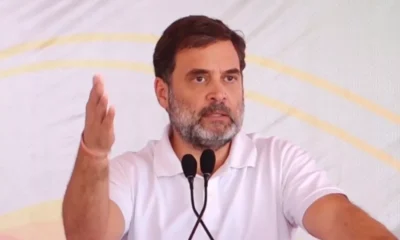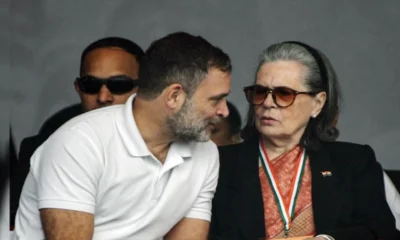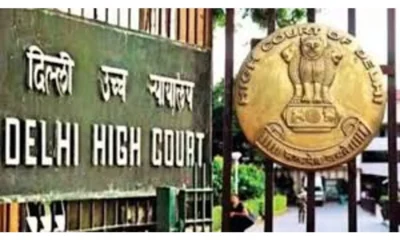[vc_row][vc_column][vc_column_text]Congress leader Sajjan Kumar was today (Monday, Dec 17) sentenced to life imprisonment in a 1984 anti-Sikh riots case for criminal conspiracy to commit murder, abetment, delivering speeches instigating violence against Sikhs and disrupting communal harmony.
The order came as a Delhi High Court bench of justices S Muralidhar and Vinod Goel reversed the judgment of a sessions court acquitting Sajjan Kumar in a case related to the murder of five members of a Sikh family — Kehar Singh, Gurpreet Singh, Raghuvender Singh, Narender Pal Singh and Kuldeep Singh —in Raj Nagar area of Delhi Cantonment on November 1, 1984, after the assassination of then prime minister Indira Gandhi.
The court said the life sentence awarded to the Congress leader would be for the “remainder of his life” and directed him to surrender by December 31, barring him from leaving the city of Delhi till then.
The court said it has partially allowed the Central Bureau of Investigation’s appeal against Kumar’s acquittal by the trial court. The probe was carried out by the CBI which re-opened the case on recommendation of Nanavati Commission in 2005.
In the same case, the high court upheld the convictions and awarded varying sentences to former Congress councillor Balwan Khokhar, retired naval officer Captain Bhagmal, Girdhari Lal and former MLAs Mahender Yadav and Kishan Khokhar.
They were also convicted for criminal conspiracy to burn down residences of Sikh families and a gurdwara in the area during the riots. They have also been directed to surrender by December 31 and not leave the city before that.
With the direction, the bench dismissed the appeals of the five against their conviction and punishment awarded by the trial court. The convicts had challenged their conviction and sentencing by the trial court in May 2013.
The trial court in May 2013, while acquitting Kumar, had awarded life term to Balwan Khokhar, Bhagmal and Lal, and a three-year jail term to Yadav and Kishan Khokhar. Today, the high court upheld Balwan Khokhar, Bhagmal and Lal life sentences and extended the sentences of Yadav and Kishan Khokar to a 10-year jail term.
The bench of Justices Muralidhar and Goel had on October 29 concluded hearing arguments on the appeals filed by the CBI, riots victims and the convicts, and reserved the judgment.
The high court had on March 29 last year issued show cause notices to 11 accused, including Yadav, in five other 1984 anti-Sikh riots cases which were earlier closed. The matter is being heard by another division bench.
The accused, who were acquitted of the charges, were asked as to why should the court not order reinvestigation and retrial against them as they faced allegations of “horrifying crimes against humanity”.
Kumar’s prosecution on November 16 came after Cham Kaur, a prosecution witness, told the court that in 1984 she had seen Kumar allegedly addressing the crowd in national capital’s Sultanpuri area where he said that Sikhs had killed “our mother”, referring to former PM Indira Gandhi. Kaur further named other people who were shot dead on the same date by the mob.
Before Cham Kaur, another key prosecution witness Sheela Kaur had identified Kumar as the one who had instigated the mob in Sultanpuri.
Calling it “an extraordinary case”, the Delhi HC observed that normal scheme of things it would have been impossible to proceed against Sajjan Kumar “as there appeared to be ongoing large-scale efforts to suppress cases against him by not even recording them.”
“Even if they were registered they weren’t investigated properly and investigations which saw any progress weren’t carried to logical end of a charge sheet actually being filed. Even defence doesn’t dispute that as far as FIR is concerned, a closure report had been prepared,” said the HC.
“The mass killings of Sikhs between 1st and 4th November 1984 in Delhi and the rest of the country, engineered by political actors with the assistance of the law enforcement agencies, answer the description of crimes against humanity,” observed the court.
It said “cases like the present are to be viewed in the larger context of mass crimes that require a different approach and much can be learnt from similar experiences elsewhere.”
Significantly, the High Court said: “Common to the instances of mass crimes are the targeting of minorities and the attacks spearheaded by the dominant political actors facilitated by the law enforcement agencies.”
“The criminals responsible for the mass crimes have enjoyed political patronage and managed to evade prosecution and punishment. Bringing such criminals to justice poses a serious challenge to our legal system. Decades pass by before they can be made answerable. This calls for strengthening the legal system. Neither crimes against humanity nor genocide is part of our domestic law of crime.”[/vc_column_text][/vc_column][/vc_row]


 Latest world news23 hours ago
Latest world news23 hours ago
 India News22 hours ago
India News22 hours ago
 Latest world news22 hours ago
Latest world news22 hours ago
 Latest world news23 hours ago
Latest world news23 hours ago
 India News22 hours ago
India News22 hours ago











